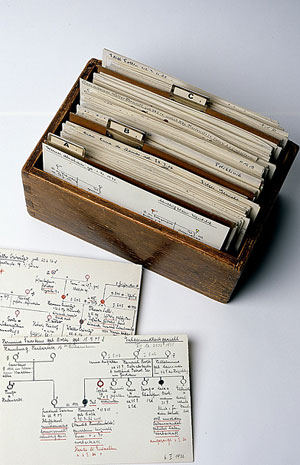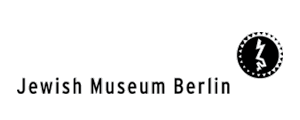"Deadly Medicine: On the Significance of Nazi Crimes for the Current Ethics Debate"
Conference on April 23 and 24 at the Jewish Museum Berlin

- Genetic information files belonging to the institution in Alsterdorf for the mentally disabled recorded and traced back behavior thought to be genetically determined.
These were often used in courts as evidence for the need to forcibly sterilize those they described.
© Evangelische Stiftung Alsterdorf, Hamburg
A collaboration between the Jewish Museum Berlin, the Institute of Medical History at the Charité Hospital in Berlin and the Topography of Terror Foundation
Please note that the conference will be held in German. We are unfortunately unable to provide simultaneous interpreters. Click here for the German program.
Biomedicine and Ethics
Biomedical knowledge and capabilities are expanding at breathtaking speed, creating the impression that we are gaining increasing control over life and death. "Babies to order," tissue engineering and other procedures arouse hopes and fears and are profoundly changing our moral views. It is almost impossible to tell which developments will have a positive outcome and where potential danger lies. Comprehensive information and broad debate are therefore essential prerequisites for defining universally binding ethical and legal norms for research and science in modern society.
Historical Experience in Germany
The debate in Germany has been heavily influenced by studies of National Socialism. The history of Nazi medicine radically demonstrates the path science can take-even if its practitioners are internationally respected in their day. In order to promote an "Aryan" ideal of human beings, the National Socialists marginalized and murdered individuals who did not fit into their view of the world, which they defined in racial-biological and social terms. Not only did the medical world lend scientific legitimacy to these crimes. It also profited when approval was given to use and annihilate people deemed "unworthy to live" in experiments and research. Such experiences are a warning to us that we must do everything in our power to recognize and counter the destructive potential of similar developments at an early stage.
Analyses, Lectures, Discussions
The first part of the conference will introduce and discuss Nazi medical research and research funding. The second part is devoted to the latest research on the killing of the sick, with a focus on the way this campaign of murder served as a model for the genocide in the death camps in the East. The third part of the conference will examine the lessons that can be drawn from historical experience, especially for education and training in the medical and nursing professions.
Certified Medical Training Program
The Berlin Medical Association has accredited the conference with thirteen points for continued medical training (VNR 2761102008107930005). If you are planning to take part in the conference as part of your advanced medical training, please present the barcode sticker with your electronic training number for registration on the first day of the conference.
When: April 23 and 24, 2009
Where: Jewish Museum Berlin, Lindenstr. 9-14, 10969 Berlin, glass courtyard
Participation fee: 30 euros, reduced rate 15 euros (for school pupils, trainees, students and recipients of unemployment benefits)
Registration: Björn Borrmann, phone: +49 (0)30 259 93 353 (ends on April 14, 2009)
